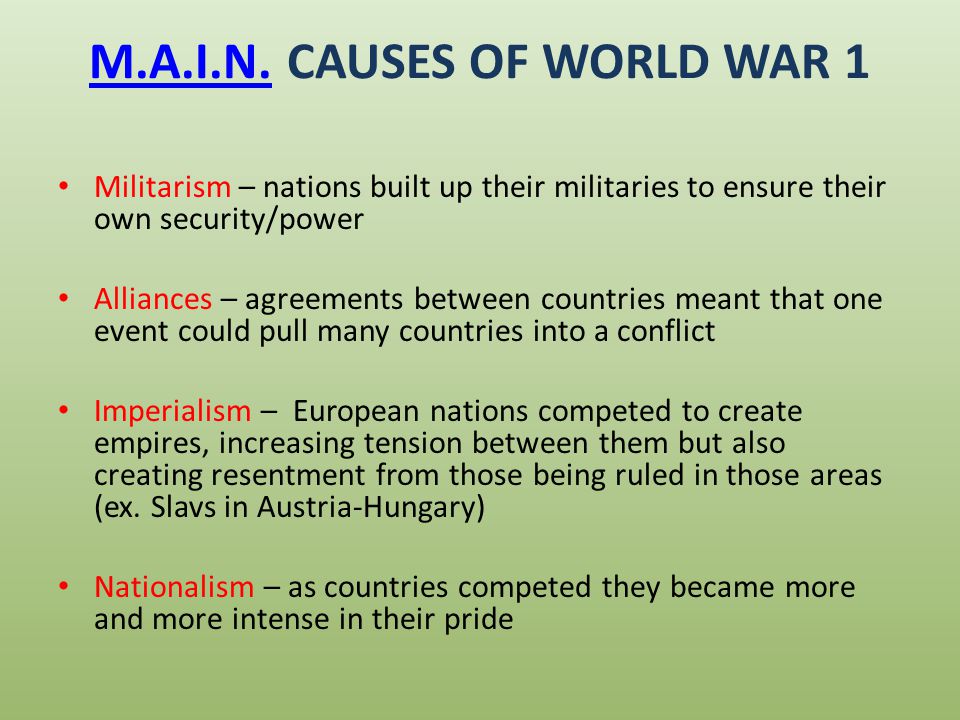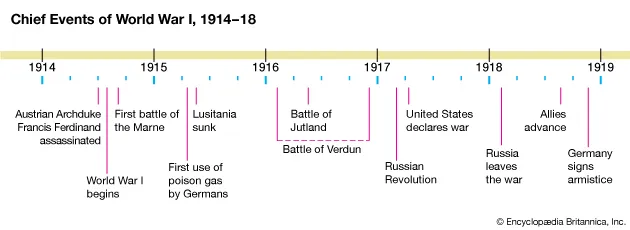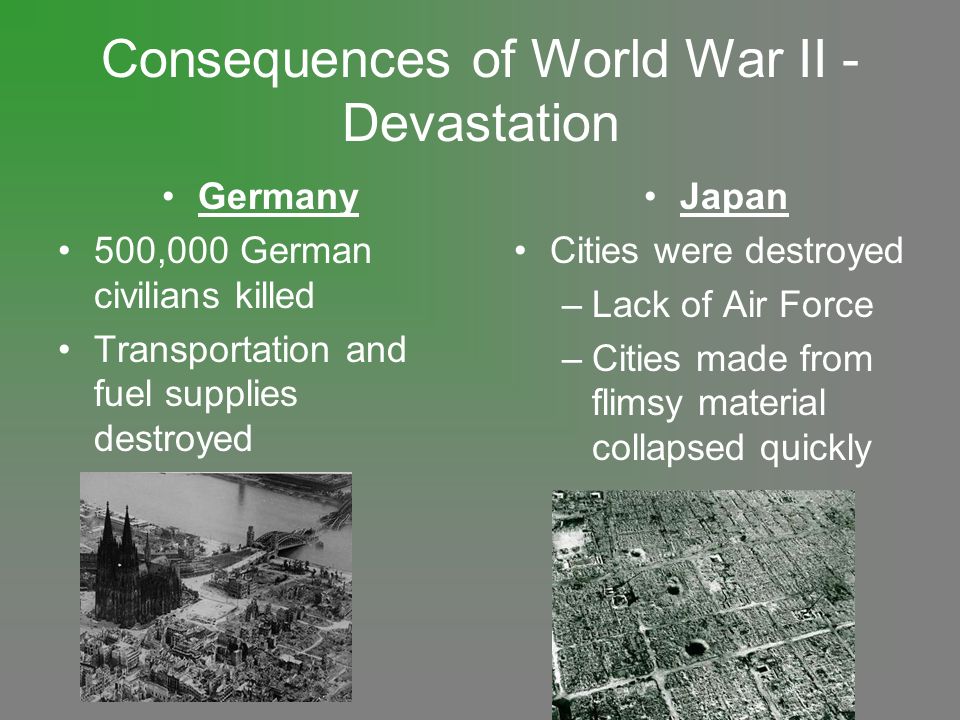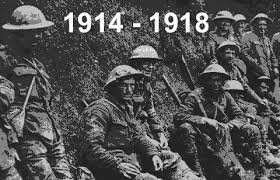World War I, also known as the Great War, was a global conflict that lasted from 1914 to 1918. It involved many of the world’s major powers and resulted in significant political, social, and economic changes. This article provides a comprehensive history of World War I, highlighting its causes, major events, and consequences. History of World War I- Its Impact on the World
Causes of World War I:
The causes of World War I are multifaceted and complex, involving a combination of long-term structural factors and short-term triggers. Here are some of the key causes:
Nationalism:
Nationalistic sentiments and aspirations played a significant role in the lead-up to the war. Across Europe, there was a growing sense of national identity and a desire for self-determination among various ethnic groups. This led to tensions between different nationalities within multinational empires, such as the Austro-Hungarian and Ottoman Empires.
Alliance System:
The system of alliances that had developed in Europe created a delicate balance of power. The major powers had formed two rival alliances: the Triple Entente (comprised of France, Russia, and Britain) and the Central Powers (led by Germany and Austria-Hungary). These alliances were intended to deter aggression, but they also created a complex network of obligations that could quickly escalate a localized conflict into a full-scale war.
Imperial Rivalries:
The late 19th and early 20th centuries witnessed intense competition among European powers for colonial territories and resources. This race for colonies and economic dominance led to heightened tensions and rivalries, particularly between Britain, Germany, and France. The struggle for imperial supremacy exacerbated existing political and economic rivalries.
Militarism:
The arms race and the glorification of military power were prominent features of the time. Nations invested heavily in their military capabilities, both in terms of weapons and infrastructure. The expansion of armies and navies, along with the development of new technologies, created an atmosphere of militarism and a belief in the effectiveness of war as a means to resolve conflicts.
Economic Rivalries:
Economic competition, trade disputes, and protectionist measures contributed to tensions among the major powers. As industrialization progressed, countries sought to secure markets for their goods, leading to economic rivalries and protectionist policies. Economic interdependence, combined with nationalist economic interests, created a volatile environment.
Balkan Crisis:
The Balkans, a region in southeastern Europe, experienced a series of political crises and conflicts leading up to World War I. The disintegration of the Ottoman Empire in the early 20th century created power vacuums and competing national aspirations in the region. The assassination of Archduke Franz Ferdinand of Austria-Hungary by a Serbian nationalist in 1914 was a spark that ignited the war.

Major Events:
Here are some of the major events that occurred during World War I: History of World War I- Its Impact on the World
July 28, 1914:
Austria-Hungary declares war on Serbia: Following the assassination of Archduke Franz Ferdinand, Austria-Hungary issues an ultimatum to Serbia, blaming them for the attack. When Serbia fails to comply with all of the demands, Austria-Hungary declares war, setting off a chain reaction of military mobilizations.
August 1, 1914:
Germany declares war on Russia and later on France: As part of the complex system of alliances, Germany declares war on Russia in support of Austria-Hungary. Germany also invades Luxembourg and Belgium on their way to France.
August 4, 1914:
Britain declares war on Germany: After Germany invades Belgium, violating its neutrality, Britain issues an ultimatum demanding German withdrawal. When Germany fails to comply, Britain declares war on Germany and enters the conflict.
Trench Warfare:
The war quickly turns into a stalemate along the Western Front, with both sides digging extensive networks of trenches to protect their positions. Trench warfare becomes a defining feature of World War I, characterized by horrific conditions and devastating casualties.
Battle of the Somme (1916):
The British and French forces launch a major offensive against the German lines in the Somme region of France. The battle lasts from July to November 1916 and resulted in heavy casualties on both sides. The British suffered around 420,000 casualties, while the Germans suffered around 500,000 casualties.
Unrestricted Submarine Warfare:
In 1917, Germany announces unrestricted submarine warfare, allowing their submarines to sink any ships, including civilian vessels, in the waters around Britain. This leads to the sinking of several ships, including the British ocean liner RMS Lusitania, which results in the loss of many civilian lives and increases tensions between the United States and Germany.
Entry of the United States:
The sinking of the Lusitania, along with other factors such as the interception of the Zimmermann Telegram (in which Germany proposed an alliance with Mexico against the United States), prompts the United States to enter the war on the side of the Allies in April 1917.
Russian Revolution:
In 1917, the Russian Revolution overthrows the Tsarist regime and leads to political instability. The new Bolshevik government, under Vladimir Lenin, seeks to withdraw Russia from the war, signing the Treaty of Brest-Litovsk with Germany in 1918.
Entry of New Nations:
As the war progresses, more nations join the conflict. Japan, Italy, and several other countries align themselves with the Allied powers, while the Ottoman Empire and Bulgaria join the Central Powers.
Armistice and Treaty of Versailles:
On November 11, 1918, an armistice is signed, ending the fighting on the Western Front. Negotiations for peace follow, culminating in the signing of the Treaty of Versailles in 1919. The treaty imposes harsh terms on Germany, including massive reparations, territorial losses, and limitations on its military.

Consequences
The consequences of World War I were far-reaching and had a profound impact on the political, social, economic, and cultural aspects of the world. Here are some of the key consequences: History of World War I- Its Impact on the World
Treaty of Versailles:
The peace treaty signed in 1919 at Versailles, France, imposed heavy reparations and war guilt on Germany and its allies. The treaty redrew the map of Europe, dismantled empires, and created new nations. However, the harsh terms of the treaty sowed seeds of resentment and contributed to the grievances that led to World War II.
Political Changes:
The war led to significant political changes in many countries. The Russian Revolution in 1917 overthrew the Tsarist regime, leading to the establishment of a communist government under Vladimir Lenin. In Germany, the war contributed to political instability, paving the way for the rise of Adolf Hitler and the Nazi Party.
The Shift in Power and Decline of Empires:
The war marked a significant shift in global power dynamics. The empires of Austria-Hungary, Ottoman Turkey, and Russia collapsed, leading to the emergence of new nations and a reconfiguration of power in Europe and the Middle East.
Economic Consequences:
The war had severe economic consequences. It caused massive destruction of infrastructure, loss of productive capacity, and soaring war debts. Many European countries faced inflation, economic depression, and high unemployment rates in the post-war period.
Social and Cultural Impact:
The war had a profound social and cultural impact. The massive loss of life and the horrific experiences of trench warfare shattered the notions of heroism and the glorification of war. Many artists, writers, and intellectuals responded to the war with disillusionment, expressed through movements like Dadaism and Surrealism.
Rise of New Technologies and Warfare:
World War I witnessed the introduction and use of new military technologies, such as tanks, airplanes, and chemical weapons. These technological advancements transformed warfare and had long-term consequences for military strategies and future conflicts.
Women’s Suffrage and Social Change:
The war brought about social changes, particularly regarding women’s roles in society. Women stepped into various roles traditionally held by men and contributed to the war effort. This, along with other factors, helped to advance the women’s suffrage movement and led to increased gender equality in some countries.
Seeds of Future Conflicts:
The unresolved issues and grievances from World War I laid the groundwork for future conflicts. The harsh terms of the Treaty of Versailles, unresolved territorial disputes, and nationalistic tensions set the stage for the outbreak of World War II just two decades later.
League of Nations:
The League of Nations was established in the aftermath of World War I as an international organization to promote peace and prevent future conflicts. While it had some successes in resolving disputes, the league ultimately failed to prevent the outbreak of World War II, highlighting the challenges of maintaining international peace and cooperation.
Loss of Life and Human Tragedy:
World War I resulted in an immense loss of life. Approximately 9 million soldiers and 7 million civilians died as a direct result of the war. The war’s human toll and the suffering experienced by millions of people left a lasting impact on the collective memory of nations and shaped the understanding of war’s devastating consequences. History of World War I– Its Impact on the World


